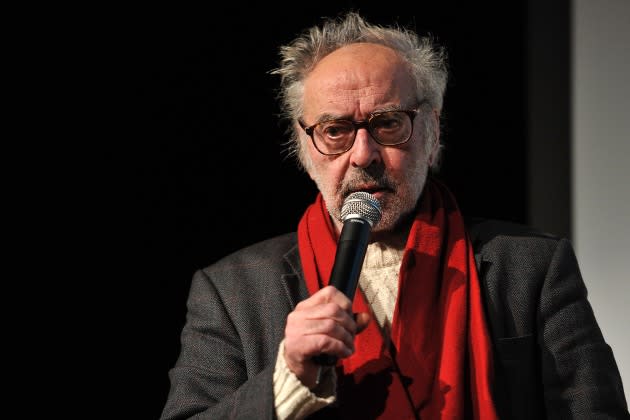Jean-Luc Godard Dies: Pioneering French Director Was 91
- Oops!Something went wrong.Please try again later.
- Oops!Something went wrong.Please try again later.
- Oops!Something went wrong.Please try again later.
- Oops!Something went wrong.Please try again later.

Jean-Luc Godard, a leading figure of the French New Wave, has died. He was 91. The French newspaper Liberation first reported the news which was confirmed to Deadline by a source close to the filmmaker.
A family representative told the BBC that Godard died by assisted suicide in Switzerland.
More from Deadline
Tributes To Jean-Luc Godard Pour In From The World Of Cinema And Beyond
Todd McCarthy: Wim Wenders' 'Room 666' Had A View Of The Future
Best known for his radical and politically driven work, Godard was among the most acclaimed directors of his generation with classic films such as Breathless (À bout de souffle), which catapulted him onto the world scene in 1960. The film was from a treatment by his contemporary and former friend François Truffaut and followed the story of a young American woman in Paris, played by Hollywood star Jean Seberg, and her doomed affair with a young rebel on the run, played by Jean-Paul Belmondo.
Hollywood & Media Deaths 2022: A Photo Gallery
President Emmanuel Macron of France paid tribute to the director with a statement on Twitter, calling him the “iconoclastic of New Wave filmmakers.”
Born in Paris in 1930, Godard grew up and attended school in Nyon, Switzerland. After moving back to Paris after finishing school in 1949, Godard found a home amongst the burgeoning group of young film critics in the city’s ciné clubs. Godard began writing for the new film magazines, including Andre Bazin’s soon-to-be-influential Cahiers du Cinema.
Godard is best known for his seminal work of the 1960s, including Le mépris (Contempt), starring Brigitte Bardot, and Le Petit Soldat, which was banned until 1963, and starred the director’s future wife, Anna Karina. Godard was married to Karina from 1961 to 1965. It was with Karina that Godard enjoyed some of his most memorable screen collaborations, including in 1962’s Vivre sa vie, Bande à part (1964), and Pierrot le Fou (1965).
In 1970, Godard met filmmaker Anne-Marie Miéville who would become a regular collaborator, and later a romantic partner after the end of his second marriage to actress and writer Anne Wiazemsky, who had starred in his 1967 political satire La Chinoise. Godard continued to work prolifically in his later years and enjoyed what many described as a late-career renaissance in the early 2000s starting with In Praise of Love (2001), which screened at Cannes followed by Film Socialisme (2010).
Godard won major European film awards including Berlin’s Golden Bear for 1965’s Alphaville and the Golden Lion at Venice for 1985’s First Name: Carmen. His most recent film The Image Book (2018) played in competition at Cannes and picked up the special Palme d’Or. However, Godard never received a competitive Academy Award nomination. In 2010, the Academy awarded the director an honorary Oscar but he skipped the ceremony. And when asked by a reporter what the award meant to him, the director who had been a longtime critic of Hollywood and its institutions responded: “Nothing.”
“If the Academy likes to do it, let them do it,” he said. “But I think it’s strange. I asked myself: Which of my films have they seen? Do they actually know my films? The award is called The Governor’s Award. Does this mean that Schwarzenegger gives me the award?”
The former Culture Minister of France, Jack Lang, told France Info radio this morning that Godard was “Unique, absolutely unique… He wasn’t just cinema, he was philosophy, poetry.”
Nancy Tartaglione contributed to this report.
Best of Deadline
NFL 2022 Schedule: Primetime TV Games, Thanksgiving Menu, Christmas Tripleheader & More
The Queen Onscreen: 15 Actresses (And Actors) Who've Played Elizabeth II In Film And On TV
'Blonde' Premiere Photo Gallery: Ana de Armas Channels Marilyn Monroe At Venice Film Festival
Sign up for Deadline's Newsletter. For the latest news, follow us on Facebook, Twitter, and Instagram.

